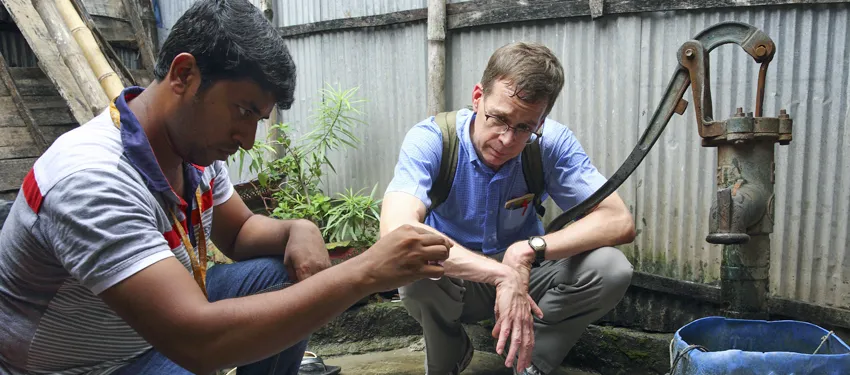
Photo courtesy Stanford Center for Innovation in Global Health: Steve Luby visits a Sattola slum in Dhaka with his team.
Stanford Medicine Scope - February 2nd, 2017 - by Rachel Leslie
Marking a milestone partnership in planetary health, Stanford epidemiologist Stephen Luby, MD, has been tapped to direct the health evaluation of a project to use water management strategies to potentially improve the lives of more than a billion people globally.
Led by Australia’s Monash University, the five-year research project — which has received a 10 million pound grant from the Wellcome Trust — aims to improve health and well-being of those living in slums by transforming water delivery and sanitation in 24 informal settlements in Fiji and Indonesia. The approach introduces green technologies and urban design to safely recycle wastewater, harvest rainwater, and protect against flooding and pollution. By ensuring a safer, more reliable water supply, the researchers aim to reduce exposure to waste and contamination.
Granted as part of the Wellcome Trust’s “Our Planet, Our Health” funding program, the researchers’ proposal was one of only four selected from more than 600 applications worldwide.
The project will produce the first-ever public health and environmental data on the outcomes of an alternative water management approach. The outcomes could potentially provide the basis for new water infrastructure policies and investment strategies for urban informal settlements worldwide.
In a Stanford Center for Innovation in Global Health piece, Luby commented:
The reason [this grant] matters so much is because planetary health matters so much. And the ability to be able to connect what’s happening on the planet to human health in a way that leverages the rigorous scientific capacities of cutting edge research – the types of research that Stanford really values. To me, this was just an excellent example of rigorous interdisciplinary collaboration taking on one of the great problems of our time.

